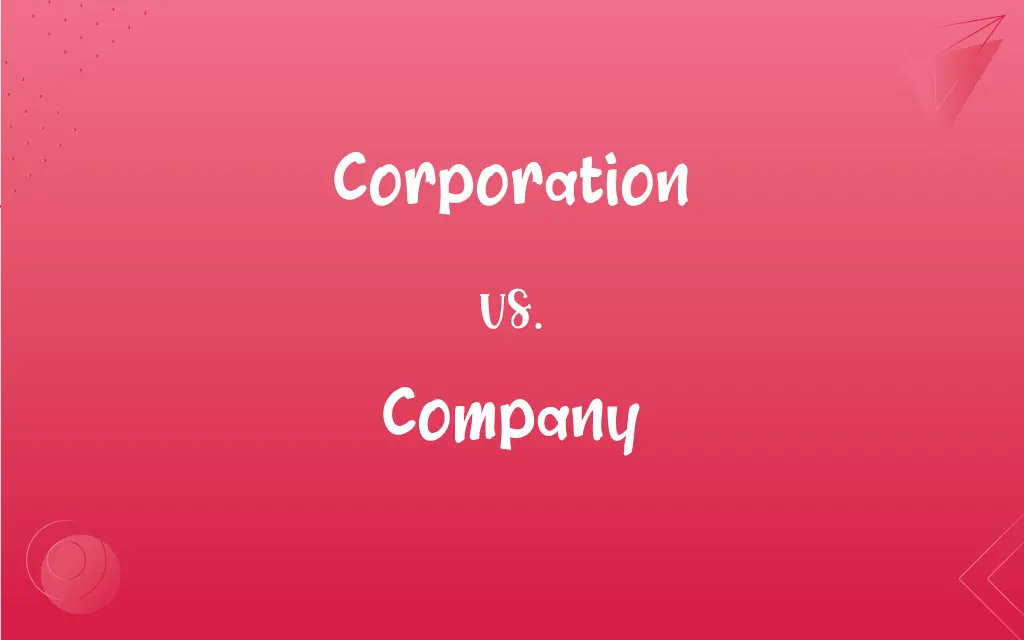Corporation vs. Company: What's the Difference?
Edited by Janet White || By Harlon Moss || Updated on October 9, 2023
A corporation is a specific legal entity with shareholders, while a company is a general term for any business entity.

Key Differences
A corporation is a business structure that's legally distinct from its owners and has its own rights and responsibilities. A company, in contrast, is a broader term that refers to any business, regardless of its legal structure.
Corporations offer liability protection to their shareholders, meaning the personal assets of shareholders are generally protected from corporate debts. Companies can be any type of business, such as sole proprietorships, partnerships, or corporations, each with its own liability implications.
While all corporations are companies, not all companies are corporations. A company might operate as a partnership, sole proprietorship, or another business type.
A corporation is created through a legal process and is subject to specific regulatory requirements, including governance by a board of directors. A company doesn't necessarily have these stipulations unless it is also a corporation.
When discussing ownership, corporations have shareholders who own shares or stock in the business. Companies, depending on their structure, might refer to owners, partners, or members.
ADVERTISEMENT
Comparison Chart
Legal Status
A specific legal entity with distinct rights.
A general term for any business entity.
Liability
Shareholders have limited liability.
Liability varies based on the type of company (e.g., partnership).
Ownership
Owned by shareholders.
Can be owned by a single person, partners, members, or shareholders.
Creation
Formed through a specific legal process.
Can form casually or through legal processes.
Examples
Apple Inc., Microsoft Corporation.
Joe's Diner, Smith and Partners, Apple Inc.
ADVERTISEMENT
Corporation and Company Definitions
Corporation
A legal entity distinct from its owners.
The corporation was sued, not the shareholders.
Company
Any business entity, regardless of structure.
His company is a sole proprietorship.
Corporation
An entity governed by a board of directors.
The corporation's board made the final decision.
Company
An entity that can hire employees.
The company hired twenty new staff members this month.
Corporation
A business that can buy, sell, and own property.
The corporation purchased the building downtown.
Company
An association of individuals in a business enterprise.
She started a company with her college friends.
Corporation
A business structure offering limited liability to shareholders.
Many choose a corporation for liability protection.
Company
An organized group involved in trade.
The company has been profitable for five years.
Corporation
An entity that pays taxes separately from its owners.
The corporation filed its taxes in April.
Company
An organization engaged in commercial, industrial, or professional activities.
The tech company launched a new product.
Corporation
An entity such as a business, municipality, or organization, that involves more than one person but that has met the legal requirements to operate as a single person, so that it may enter into contracts and engage in transactions under its own identity.
Company
A group of persons
A company of scientists.
Company
One's companions or associates
Moved in fast company.
Is known by the company she keeps.
FAQs
What's the main distinction between a corporation and a company?
A corporation is a specific legal entity, while a company is a broader term for any business.
Do corporations always have stock or shares?
Typically, yes, corporations issue stock or shares to represent ownership.
Are all companies corporations?
No, companies can be various structures, only one of which is a corporation.
Can a single individual form a corporation?
Yes, single individuals can form corporations in many jurisdictions.
Which is better for a new business, becoming a corporation or a company?
It depends on the business goals, liability concerns, and tax considerations.
Can a corporation be a small business?
Yes, corporations can be small, medium, or large businesses.
Can both a corporation and a company have employees?
Yes, both corporations and other types of companies can hire employees.
How do corporations and companies pay taxes?
Corporations pay taxes separately from their owners; other company types might have pass-through taxation.
Can the terms corporation and company be used interchangeably?
While all corporations are companies, not all companies are corporations, so context is essential.
Can a corporation own another company?
Yes, corporations can own or have stakes in other businesses, whether they're corporations or other types of companies.
Is it challenging to change a business from a company to a corporation?
Transitioning involves legal processes, and complexity varies based on jurisdiction and business size.
How do partnerships differ from corporations and companies?
Partnerships are a type of company with two or more owners; they lack the liability protection of corporations.
How does ownership transparency differ between corporations and companies?
Corporations typically have clearer ownership structures via stock, while other companies might not.
Which has more regulatory oversight, a corporation or a company?
Corporations generally face more regulations due to their distinct legal status.
Can both corporations and companies go public?
Typically, only corporations go public by issuing stock in an IPO, but the exact requirements can vary by jurisdiction.
Is the liability protection always absolute in corporations?
While corporations offer limited liability, certain actions or negligence can pierce this protection.
Are there global differences in defining a corporation and a company?
Yes, definitions and implications of these terms can vary by country.
Do corporations always need a board of directors?
Most jurisdictions require corporations to have a board, but its composition can vary.
Do corporations have a longer lifespan than other companies?
Corporations can continue beyond the lives of their owners, while other company types might dissolve upon an owner's departure.
Do both corporations and companies contribute to the economy?
Yes, both play vital roles in economic activity, job creation, and innovation.
About Author
Written by
Harlon MossHarlon is a seasoned quality moderator and accomplished content writer for Difference Wiki. An alumnus of the prestigious University of California, he earned his degree in Computer Science. Leveraging his academic background, Harlon brings a meticulous and informed perspective to his work, ensuring content accuracy and excellence.
Edited by
Janet WhiteJanet White has been an esteemed writer and blogger for Difference Wiki. Holding a Master's degree in Science and Medical Journalism from the prestigious Boston University, she has consistently demonstrated her expertise and passion for her field. When she's not immersed in her work, Janet relishes her time exercising, delving into a good book, and cherishing moments with friends and family.































































